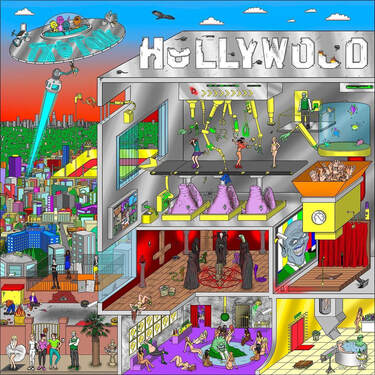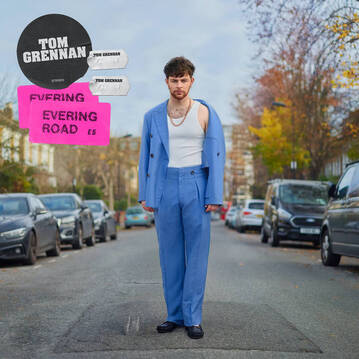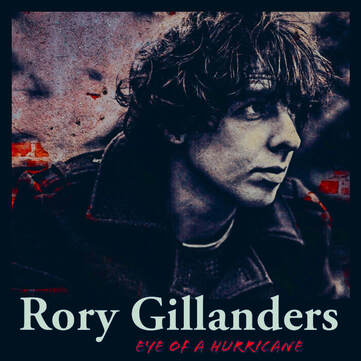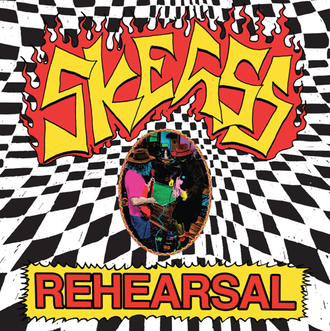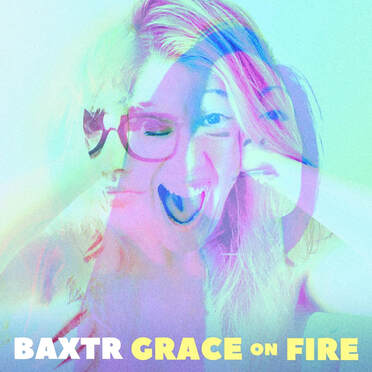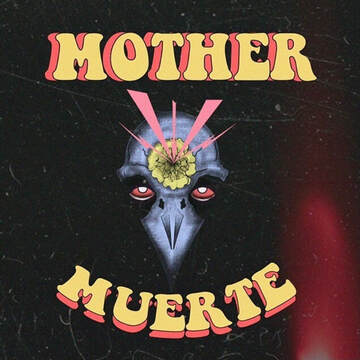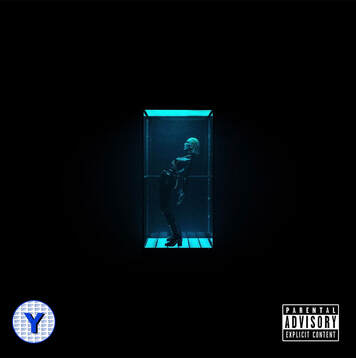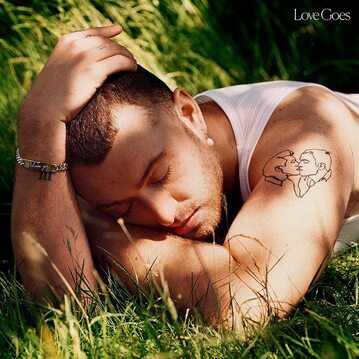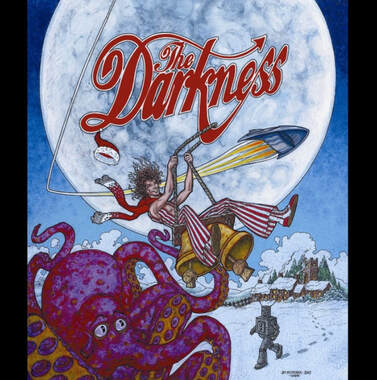|
By Edward Burnett I had the pleasure of interviewing English band TxtTalk back in February when they were promoting their single, ‘Hollywood’. The interview was a fun chat which gave a real insight into the bands methods which you can read here. The boys from Hastings are back on our radar again with the recent release of the follow-up single ‘Head Out’. This release is a groovy and chilled track that combines numerous genres with aspects of funk, dance and even reggae beats all featuring. This combination results in the ultimate chill-out song for Summer 2021. Yet as fabulous a sequel as ‘Head Out’ is, I’m here to talk about ‘Hollywood’. Now that I’ve had a couple of months to truly ponder on this song, I find myself loving it more and more, truly thinking that this is a top, top track. I feel this single release succeeds in all three areas of discussion: theme/lyrics, tune/music and artwork. Starting with the lyrics and tale of TxtTalk’s ‘Hollywood’, the song discusses the themes of stardom and how just maybe it’s not all what it’s cracked up to be. These are important messages to be being delivered by a smaller and upcoming band. It’s a unilateral message of keeping one’s head screwed on and not getting caught up in the glitz and glamour that comes with success in the entertainment industry. Falling into that trap can famously (mind the pun, I know, I know) lead individuals to stray from the beliefs and style that got them to the pearly heights in the first place. This message can clearly be shown in the track’s chorus as the boys sing “Cause this is Hollywood/And I bet you've never felt this good/You've got to give yourself/Brand your soul for someone else”. Here there’s the sarcastic jibe about how you’ve achieved the golden dream that everyone strives for, you must be feeling amazing? This question is satirically posed with the asker knowing full well that you don’t feel amazing as you’ve no doubt had to sell parts of yourself to get into the scenario, shown by the soul branding imagery. Few bands not only address this particular important topic in their music and even less would be so bold as to focus on it on an early single. TxtTalk deserve massive commendation for not only doing this but for doing it so effectively and stylishly. To achieve this style though, the tune of the song has to be as crisp as the unique topic. The music itself on the single we are now talking about is therefore the core of the release and ultimately the way in which the band can convey the all important message featured in their lyrics. The track is bouncy and pop heavy but unmistakably indie. Therein lies the perfection melodically. This positive and fast paced tune allows the listeners to zoom along the song without seeing the time instead being lost in its fun and funky attitude. The single never goes too heavy either despite the at times depressing topic of losing who you are, rather TxtTalk maintain an upbeat melody throughout ensuring the stardom paradox is fulfilled via the musical notes themselves. Yes it sounds so fun and happy but in reality what is being sung is deeply sad when thought about. The fact the band can convey the overall theme of the song via the music itself rather than just the lyrics is an immense feat which demands recognition. Finally, the artwork on this single is truly beautiful with the massive canvas do inter-sprawling characters and Hollywood references all culminating in a Where’s Wally-esque image. The picture was drawn up by friend of the band Zak Comyns and Zak’s creative work really isn’t lost on the band either. The guys said about it that “there’s a lot of references in the artwork, from the Church of Scientology to Marilyn Monroe, it's really cool to take a closer look at”. To have a young band so committed to putting out quality album covers alongside of course the amazing music within, is a real treat. All in all, ‘Hollywood’ is a stupendous single full-stop, let alone when considered it’s been released from an upcoming band. With mature topics and a truly fresh tune which is all wrapped up with a gorgeous and clean-cut artwork cover, the listeners are well and truly given the full package. This is indie music in its prime and the UK industry should feel very proud to have a talented band like TxtTalk firmly on the way up. Already following up this gem with the great ‘Head Out’, the boys from Hastings genuinely have a glittering career ahead of them. After a review like that, I bet they’ve never felt so good. I’ll see myself out. If you would like to find out more about TxtTalk and keep up to date with the band's latest releases, the links to all their socials can be found below via the icons:
0 Comments
By James Bentley Tom Grennan is a relatively new artist on the music scene. Although his vocals have been featured on tracks by the likes of Bugzy Malone, and Chase & Status, the voice of this young man will have (as of late) remained unfamiliar to many. Despite the release of his debut album ‘Lighting Matches’ which charted at number five in the UK back in 2018; he was yet to make a true impression on the industry. However, on 12th March, the 25-year-old from Bedfordshire released his sophomore album ‘Evering Road’. Unlike his previous album, 'Evering Road' debuted at number one on the UK Albums Chart. Consisting of 14 tracks, and only 46 minutes long, the album takes center stage, and certainly does not shy away. A mixture of indie, singer/songwriter and pop, the album seizes the opportunity to address life’s everyday issues and insecurities, i.e. self-esteem, intoxication, health and most indefinitely - romance. Yet what makes this album so special is that it uses it’s upbeat melodies, powerful vocals, and ballad like compositions to shed light and breath positivity into these subjects. Now, an album of this quality could easily be broken down and analyzed track by track. However, as this is an article and not an essay, I can only delve into a selected few. My first track of choice is also the first track on the album – and this is no coincidence. I am a very strong believer that the first track of an album is one of the most (if not – the most) important tracks on there. ‘If Only’ is a superb opening track, and perhaps one of the most welcoming introductions to an album I have heard for a while. Not only is it composed with power and excitement, but as the young musician revs his vocals like a Lamborghini engine, it certainly grabs your attention and leaves you wanting more. Furthermore, it sets the tone beautifully for the rest of the album. Following on from this is ‘Something Better’. One of my fellow peers at here at RNRR referred to the song as a ‘bop’ - a one word description that I am still yet to top in accuracy. It’s bouncy, it’s fun, and truthfully, I am unable to listen to it without ‘bobbing’ or ‘swaying’. However, what makes this song so brilliant is the depth of it. The upbeat tempo conflicts with it’s contents – struggling to move on from someone you still love. The conflict is used to illustrate the artists mental state of confusion as he finds himself unsure of what to do and how to feel. Not only do I feel that this contrast bares resemblance to that of The Smiths, but it also illustrates just how much of a genius Tom Grennan can be as a musician. My next song of choice is ‘Little Bit of Love’. This is the most recognised and successful song of the album, peaking at number 8 in the UK charts. It is certainly one of the more ‘pop’ like songs on the album, and that is exactly why it stands out. Not only is it extremely catchy, but it also expands further on the content of ‘Something Better’. Between the deep passion, pain and desperation in the vocals, and lyrics such as ‘swimming in the deep end / tryna find my way back to you’, it is evident that you are listening to an individual drowning in their own thoughts. You can hear the fixation outgrowing the desire itself. Both the buildup, and slight lift in tempo on the final chorus I feel represents that tiresome exhaling sigh - the exhaustion of forever circling around your brain and achieving nothing. My final song of choice is ‘You Matter to Me’ which incidentally is my personal favourite from the selection of tracks. Throughout this article, I have used words such as ‘catchy’ and ‘upbeat’ to illustrate the overall tone of this album. However, ‘You Matter to Me’ is a soft and beautiful ballad that not only places much more emphasis on the young artists singer/songwriter abilities, but also demonstrates just how varied he can be with his musical talents. Place Adele, Sam Smith and Rag ‘n’ Bone Man in a pot, give it a stir and this is the result. Lyrics including ‘Maybe I was chasing something that wasn't there’ paint a sorrowful but unerring portrayal of an individual acknowledging the bitter truth of their own reality. I also feel that it conveys a very important message about acceptance, and learning that the right thing isn’t always necessarily the good thing. As I stated earlier, an album of this calibre could easily be broken down track by track. With that in mind, I would like to offer out some honorable mentions before I conclude this article. Such tracks include: ‘Amen’, ‘It Hurts’, ‘This is the Place’, ‘Love Has Different Ways to Say Goodbye’, and of course, the mischievous, but down to earth duet with Ella Henderson; the encore of the deluxe edition – ‘Lets Go Home Together’. Overall, I think it is safe to say that I consider this a fantastic album. It might not be the most original piece of art to enter the charts in the last five years, but it’s still refreshing nonetheless. It’s consistent, yet varied, and has the ability to pack so much into just three quarters of an hour. With lyrics like ‘Jealousy ain't gonna make a man out of you’ ('It Hurts'), I would consider it to be the heart to heart we never knew we needed. A strong four out of five and an album that I can definitely listen to again and again. If you'd like to find out more about Tom Grennan and keep up to date with his latest releases alongside 'Evering Road', the links to all his socials can be found below via the icons:
By Emma Furrier Irish singer-songwriter Rory Gillanders returns with a new track ‘Eye of the Hurricane’ set to be released on April 9th as the first single from his upcoming third EP ‘Wilderness’.This folk-rock track follows suit to his signature style, and relates to many issues experienced in the modern world. Drawing inspiration from acts like Bob Dylan and Noel Gallagher, Gillanders’ maintains a modern folk sound with a clear and honest approach. Having grown up facing anxiety, his music chronicles tackling mental health in an unabashed and heartfelt way. ‘Eye Of A Hurricane’ is his first single release following his two EP’s, 'Tomorrow Means Nothin’' (2017) and 'Waiting' (2018), and is perhaps one of his most honest tracks to date. The track begins with the melodious strumming of acoustic guitar that pays homage to his roots, and his opening lyric, “I want to blast out over the cosmos with you in my arms' creates a lush imagery that sets the tone for the track, as it then builds up in a staggering beat. While the song is an acoustic led track, the tempo quickly escalates with the entrance of a steady drum beat, creating an ever-growing pace that harnesses a deep energy. There is a noted similarity here to Bob Dylan’s ‘Hurricane’ with its foot-stomping beat and heavy layering of sounds, while nodding towards the folk roots of story songs. While its influences are clear, Gillanders still explores his own narrative in songwriting, in a plaintive and meaningful way. Honing in on his singer-songwriter roots, Gillanders stated of the track, “The song came to me in a dream. I was looking down at a hurricane causing all this destruction but I felt calm. I woke up and thought, there’s gotta be an idea for a song in this. I guess this song is about hope and trying to keep moving forward no matter what obstacles life throws at you”. Applicable to modern days, this track sings of hope and reassurance without hesitance. There are sonically many layers to it, which he approaches full-throttle. Comfortable in its folk-rock style, there is a live sounding quality to the track, full of crisp guitar and pounding drums atop a punchy chorus. There contains a steady buildup of energy in the structure of the song, as well as quality of the performance, reminiscent of the climax of adrenaline experienced during a live show. During these dark days of a gig-less lifestyle, this is a much-welcomed element to the track that brings listeners back into that live setting. As Gillanders sings “And I’m tryna figure out just where I belong/ This world can drive you insane/ Trying to figure out just where I went wrong/ But I feel like I’m stuck in the eye of a hurricane” the gentleness of that sentiment is blanketed around a rock ‘n’ roll twang and full band sound, with echoing guitar hooks. The track then climaxes with Gillanders bellowing the song title lyrics on repeat, “I feel like I’m stuck in the eye of a hurricane”, accumulating into the likes of an acoustic-rock anthem. The thumping of percussion is met with the welcomed entrance of electric guitar, with harmonica layered atop the persistent sound. It builds up stronger until the track reaches its own climax, paralleling a raging hurricane, and dies down in a similar fashion. The song ends with the roaring of electric guitar halting to a final screech as the drum beat fades into the back, signaling the storm is passing, and then we are met with silence, similar to the quiet after a storm. In this single, Gillanders beautifully constructed his lyrics to flow with the music in a realistic and purposeful way, taking listeners on a journey along with him through the storm he dreamed up. If you would like to find out more about Rory or keep up to date with his latest releases, including 'Eye of the Hurricane', then the links to all his socials can be found below via the icons:
By Edward Burnett Australia has been the breeding ground of several great indie bands in recent years with the rapid emergence of Tame Impala and DMA'S just to name a few. Yet there is a new name to add to that list as Skegss, with their unique brand of surf-punk, are taking the indie-rock scene by storm. The band who originally formed in 2013 in Byron Bay consists of Ben Reed on vocals/guitar, Toby Cregan on bass and Jonny Lani on drums. Following on from their 2018 debut album ‘My Own Mess’ which reached number 2 in the Australian charts, the boys are set to release their sophomore album next week on March 26th. Entitled ‘Rehearsal’, the thirteen song strong musical collection is a fresh blend of upbeat soft indie mixed expertly with with relaxing lyrics which all culminates in a genuinely authentic Australian surf/beach vibe. As there are indeed thirteen songs and this is supposed to be a brief and to the point article, I’m not going to go into detail on every one of them. I have however selected two which I think reflect the overall feel of the album and are real gems in their own right. The first of the two is the band’s newest single ‘Valhalla’ which has already been released. The song is one of the heavier ones featured on ‘Rehearsal’ with a dominating, fast-paced guitar riff which runs thoroughly the whole song, never stopping to take a breath. This particular adrenaline rush is only enhanced by the introduction of a rapid drum beat which kicks in on the chorus. There is a confident boisterousness that reverberates through lead singer Ben Reed’s voice which demonstrates his vocal versatility from the calmer and more relaxed features on ‘Rehearsal’. The lyric structure is fairly simple on this particular track but that is by no means a negative as it allows for the tune to take centre stage in dictating the song’s feel and thematic direction. The second song I have selected to analyse is the unreleased (as of yet) ‘Running From Nothing’. This is far calmer than the punky ‘Valhalla’ and carries more weight on the lyrical side of affairs hence why I’ve chosen these two songs to show a contrast that appears on ‘Rehearsal’. The song starts with the familiar message of doubt/self confidence which is a relatable topic for many listeners. This is shown in the opening lyric: “running from nothing so nothing can haunt me”. It is a mature topic to focus on rather than the all too overused themes of love or love loss which feature heavily in modern music. Skegss instead focus on self reflection in how usually the negatives we fear or overthink aren’t usually the real, rational or as bad as we think which causes us to indeed run from nothing. The softer, steady guitar track compliments the song as it allows the message to be fully taken in via the lyrics without the instruments taking full precedence. Overall, Skegss’ upcoming sequel album ‘Rehearsal’ is a refreshing addition to the modern day indie-rock scene. The Australian outfit have given us a diverse album which genuinely fits as a soundtrack to most scenarios no matter the mood or occasion. This universality is certainly hard to come by in music these days and that alone is cause for praise. The boys many new based down under but if they quality of their music stays at this level, the only direction they’ll be heading is up to the top for sure. If you would like to find out more about Skegss and keep up to date with the release of 'rehearsal" this week, the links to all their socials can be found via the icons below:
By Emily Duff BAXTR are a London outfit creating Alternative Pop-Rock with a blend of dreamscape sounds. Released on the 12th of February, ‘Grace on Fire’ is the third single from BAXTR, following on from their last release ‘Feathers’ which dropped in September. Consisting of three close friends, Floss Mackintosh (lead vocals and rhythm guitar), Bash Powers (Guitar, backing vocals and keyboard), and Keiko Jackson (Drums and backing vocals). Having known each other for over a decade, the trio had always envisioned making music together and during the 2020 coronavirus lockdowns finally got the chance to make that dream a reality. Self-proclaimed nerds, BAXTR label their music as DIY Geek pop-rock in dreamspace, a very eclectic description. To me, listening to ‘Grace on Fire’ the band seem to be less ethereal and more experimental. Rather than having a synth element to their tracks that usually comes with this idea of dreamscapes and bubble pop, BAXTR seem to rather create a Paramore-esque sound with dramatic, almost ballad-like, female vocals over the top of juxtaposing rock guitar riffs. Priding themselves on their kitsch, flamboyant sounds - the outfit bring both fun joy and a sense of female empowerment. With a sound eliciting a mixture of 80's pop and 90's rock bands, BAXTR manages to provide the New Wave Brit Pop bangers you never knew you needed. Although their music comes across as rather simple and not far from the norm in comparison to their elaborate self-descriptions, the band’s enjoyment and passion for making music are very clear purely through the energy in the tracks. With great feedback from the likes of BBC Radio One, even before its release, this track is due to be a summer anthem. Contrasting their last release, ‘Feathers’, ‘Grace On Fire’ is a much more lowkey sound. With use of more simple vocal rhythms, the track gives listeners a chance to focus on the instrumental accompaniment unlike ‘Feathers’ which focused on intense vocals with a heavy guitar in the foreground. Always bringing positive vibes, while ‘Feathers’ fought the idea of self-acceptance, ‘Grace On Fire’ argues the point that people can’t be controlled or have their mind changed - both equally important messages. With lyrics explaining, “Every day I tell her that I love her”, and an acknowledgement that, “It’s not my place”, this track shows friendship at its finest form. Doing the most you can isn’t a guarantee they’ll do the right thing but nobody can be forced to go against their heart, even if they know it's wrong. Despite being a new band, BAXTR are bringing a fresh energy that explodes with realism but manages to still remain positive - even the colourfulness of their artwork brings a cheerfulness. If you would like to find out more about the BAXTR girls or keep up to date with their upcoming releases, the links to all their social medias are below via the icons:
By Emma Furrier Mother Muerte is a California-based rock duo, comprised of lead singer Chelsea Salanoa and Jose Cadenas on drums and percussion. Originally hailing from San Francisco, they’ve now planted their roots in Vallejo, California, where they draw inspiration from its Mexican origins to incorporate into their unique, Latin blended sound. Having met approximately 8 years ago while each playing in separate bands, the duo began writing and playing together in 2015 and have since released two albums together under Mother Muerte. Musically, both members bring different influences and sounds to the band. Growing up listening to genres such as metal and Latin, Jose incorporates this into his percussion style, while Chelsea brings in her love for 60s and 70s rock and folk music. With both of these contrasting influences known, it is evident in their sound that Mother Muerte integrates each spectrum of sound, while putting their own unique spin on their style. Classifying themselves as creating “mystical rock ballads infused with danceable Latin rhythms”, the band truly combines a variety of styles, which result in a haunting, compelling and instantly identifiable quality. Their most recent release, ‘Mother Muerte (Demo)’, is a twelve-track album released on November 2, 2020. This album contains three singles, ‘Stranger’, ‘Restless’ and ‘Creature’, all of which put you under a trance with their psychedelic infused Latin rhythm. The album’s opening tack, ‘The Burden’ kicks off with the chiming of cymbals and simple chord progression, which then picks up and dives into a rhythmic, Latin-influenced rock ballad. Chelsea’s vocals pair perfectly with the drawl of guitar, holding a haunting quality that lingers with every lyric. The track quickly picks up its tempo, and a variety of Latin percussion instruments are heard joining in sync with one another in the background, while the guitar roars in a style reminiscent to 70s rock and roll. In the breakdown, Chelsea sings melancholically, “I will meet you once again/In my dreams or in my death/Crows of sorrow, guide me home/Mother Muerte rest my soul”. This song is the perfect opener to the album, as it introduces the band’s soul-stirring sound, while presenting their thematic approach to darker subjects of life, love, and loss. The subsequent track, ‘Devil’s Interlude’ flows seamlessly into a slower rhythm, while complementing its preceding track perfectly. The insistent strum of guitar leads you into a trance, while the surrounding percussion picks up faster and faster, until it explodes in a palpitating Latin track that leaves you with the demanding urge to dance and sway. Conga drums tap out a high tempo, rhythmic flow that is layered under the demanding riffs of guitar. They flow perfectly together; each contouring into a progressive cadence that resembles a haunting melody in the likes of The Velvet Underground meets Santana. Each track on this albums flows synchronically into the next, almost as if it is a continuation, or an afterthought expanded on in a variety of clever ways. Together, this builds into a thematic, moody piece of work that insists on being played in its entirety. The track ‘Smothered in a Dream’ falls into a swagger of guitar that resembles classic southern rock, a-la ZZ Top La Grange era, with a dirty, rock and roll essence. The foot-stomping breakdown of the song explodes into a roar of kick drums and bass while the lyrics “She promised me light at the end of the tunnel/Flowers at the base of my grave/ Love, and tears of affection/But she giveth and she taketh away/She taketh away” bring the song to a grand finale, shadowing its own subject. The next track ‘Restless’ follows in suit of its prior musical instrumentation, while adding the draw of conga or wood block sounds, integral in Latin production. Almost suddenly, the song picks up in speed, creating a sense of urgency, before dropping back down into a slower and steadier beat. The track takes us on a ride, up and down, ebbing and flowing in whichever way Mother Muerte wants us to go. There is a relentless beat to it that demands attention, while the vocals pour out over the track in a stirring echo. There is a deliberate measure here, and the track is laid out as if the band knows exactly where they want to take us, as the audience lays right in the palm of their hand. It is one the longest cuts on the album, coming in at 8:07 full of alternating inflections and expressive Latin rock. Other tracks on the album such as ‘G.O.D. (Gift of Death)’, ‘Stranger’ and ‘Bed of Cempasuchil’ live in the same realm of Latin rock, while also adding elements of reggae, bolero, southern rock and roll, and alternative rock. The entirety of this album is thematic, and holds a haunting quality to it, reminiscent of a soundtrack to films such as Tarantino’s ‘From Dusk till Dawn’. With their steady build in tempo, heavy use of percussion and guitar, and lyrical focus on life, death and traditional Mexican elements, Mother Muerte establishes themselves as truly evocative Latin-fused rockers, while unequivocally stepping outside of the box. Unafraid to blend a variety of genres, they represent American rock in its purest form, taking traditional elements and building them into a larger-scale presumptuous blend of influences and style, that is uniquely and unabashedly their own. If you would like to find out more about Mother Muerte and their latest releases as well as news, the links toothier socials can be found below via the appropriate icons:
By Edward Burnett Those who are long term readers of Rock N Roll Reports will be very familiar with Brighton rock band YONAKA Who have been the focus of previous articles as well as a special exclusive interview back in November on the site. The band released a new single last week entitled ‘Seize the Power’ and naturally we just had to cover it. This isn’t your standard single though as it actually brings with it big change alongside the expected familiarity. To truly analyse this change, I am going to divide the single into three different themed categories of discussion. Firstly the musical style then the lyrics behind it and finally the unique use of tonal shift with colour’s role in enforcing this. As promised, I am starting with the music and sound itself. Lead singer Theresa Jarvis is well known for her amazing vocal capabilities and these are unsurprisingly on show here again. However, here is where the first change lies as far as this single is concerned. There is far more presence of spoken word in this song than in any of YONAKA’s previous back catalogue of work. This change is needed though for the topic of the song as it allows Jarvis’ voice to come through as sermon-like, connecting with the listener on a deeper level with this direct approach. This is all the more important with when the theme of empowerment is considered which runs through the whole of ‘Seize the Power’. It is the resounding message of getting up and fighting again which will be spoken about more in the lyrics section but it is nevertheless vital to mention now as the two go hand in hand. The drums from Rob Mason start simplistically with a steady and slower beat than usual but soon build to a far more rhythmic pattern which compliments the single’s chorus and in total acts to ramp up the emotion behind Jarvis’ vocals. Now onto the topic of this song and the lyrics which help convey it. ‘Seize the Power’ seems like a check up on yourself as a listener, especially your mental health. Like the title suggests, it is fully about seizing that power and empowering oneself to do what has been viewed as the impossible for too long. YONAKA encourage us to break through these self imposed barriers of doubt reminding us of the power we all have as individuals. This core message is undoubtedly influenced by the Covid pandemic and its depressing reverberations around the world with social distancing and lockdowns negatively affecting many people’s state of mind. Yet Jarvis states at the beginning that she “woke up this morning...looked in the mirror” and felt “different” as she had “finally made a decision”. Here she is empowered by making a positive step in the way of decisiveness, escaping those perils of doubt which have rendered many to be unmotivated to seize their life back during the pandemic. Following this, Jarvis opens it up to the listener asking “hey there, how you been?”. This is a question which essentially now more than ever we need to ask one another. Looking out for others and even simply asking if they’re okay is empirical. The key line which summarises this whole message to perfection is “as soon as you taste independence, you start living in the present”. As most of our lives have been on pause this past year, none of us have been living in the present but rather a limbo which we are only starting to come out of. Our independence has been somewhat removed with continuous lockdowns and curfews being enforced by governments globally in an attempt to tackle the spread. With all this in mind, that lyric resonates all the more powerfully knowing that’s we can start to live again. It is an undying message of hope as well as the mentioned welfare and empowerment. Finally we come to arguably the most important change of all with this 2021 release, the tonal shift in colour. Previous YONAKA releases, including 2019’s debut album ‘Don’t Wait 'Til Tomorrow’, have predominantly featured red as the core colour of the artwork as well as the bands “Y” logo. I see this as reflecting the band’s music at the time with red often being used to show anger and therefore unhinged emotion. Such unhinged and raw emotion was always present in YONAKA’s previous songs showing the red to be an accurate thematic reflection on the music produced. However with ‘Seize the Power’ there has been a noticeable colour change from this familiar red to a tranquil blue. Even the band’s logo has embodied the new colour too. Make no mistake, this again is key to the current ethos and mood of YONAKA’s new song. Blue is a calmer colour which can be shown to represent more control rather than unhinged, raw emotion. This tonal shift is evident in the music as Jarvis is far calmer and composed via the spoken word throughout the song and that undying desperation has been replaced by an unwavering confidence, reflecting a gaining of control. Another way of saying gaining of control? Seizing the power. Overall, this is an extremely brave and bold single to produce which is full of thematic as well as stylistic change, all while maintaining the brilliant core essence of YONAKA. This hopeful message of empowerment is exactly what both the rock music scene and the world in general needs given our drastic situation. It’s certainly worthwhile listening to YONAKA on this topic of seizing power as they are experts on doing so. With music as good as this to follow up on an already amazing debut album, the power is well and truly in their hands. If you would like to keep up to date with the latest releases and news form YONAKA's camp, you can find the links to all their socials via the icons below:
By Emily Duff Sam Smith has finally released their third album, 'Love Goes', following on from 'In The Thrill of it All' which came out in 2017. Despite the three year hiatus, Sam Smith manages to maintain their usual emotions - with the break potentially exaggerating the passion that we’re so used to hearing. The opening track, ‘Young’ is a very short a cappella track with the only sounds outside of Smith being a baking vocalist. Ending with the lyrics, “I’ve done nothing wrong, I’m young”, demonstrates the poignant emotion of the album, and specifically that tune. Following this track is, ‘Diamonds’. As described on Smith’s instagram, 'Love Goes' is a “celebration of youth and music and singing like a drama queen” and they reiterate the fact it was created to be a friend of the listeners. ‘Diamonds’ completely encapsulates this idea. Despite beginning with a seemingly equally slow paced track, beautiful piano accompaniment takes a back seat just before the beat drops and Smith’s disco inspirations shine through. In the middle of the album, my favourite track, ‘Dance (‘Til You Love Someone Else)’ shows its face. Usually more appreciative of Smith’s ballads, something about ‘Dance (‘Til You Love Someone Else)’ provides an upbeat energy that is really needed to uplift its listeners and briefly distract us from the bleakness of 2020. Despite its pessimist lyrics, Smith’s vocal range accompanied by a soft dance beat and vocal distortion blurs the focus of the track to be something you can’t help but dance along to - especially with the repeated, “dance, dance, dance” acting as imperative instructions. Later in the album, ‘Dancing With A Stranger’, provides more of the energy you’d expect from Smith since his . A collaboration with Normani, their soft vocals complement each other perfectly. Contrasting the opening track, ‘God Knows’, this tune is a proper party anthem. Following this, ‘How Do You Sleep?’ begins with an almost ethereal twinkle instrumental. The dream-like vibes are then increased with Smith’s calming whispered vocals before dropping to a pop atmosphere in the chorus. Half way into the song a dance instrumental and distorted vocals take over briefly and continue to mingle within the rest of the chilled verses. Ending with ‘Promises’, a track Smith collaborated with Calvin Harris on, ends the album in an upbeat party mood. Originally released in 2018, Smith clearly felt the track summarised the dancey atmosphere created in 'Love Goes' - perfect for a “celebration of [...] singing like a drama queen”. In conclusion, 'Love Goes' is an album that goes through all of the motions from disco to instant club classics as well as Smith’s typical ballads. Very conducive to their constant amalgamation of genre, 'Love Goes' is a perfect album to play in concession without getting bored. If you would like to keep up to date with Sam Smith's latest releases, their social medias are available via the icons below:
By Emily Duff and Emma Furrier
1. Best Album Emily: IDLES - ‘Ultra Mono’ WHY - I have loved this band for years and so a new album is always gonna excite me. The thing I love most about IDLES is not just their heavy beats I wanna mosh to but the fact that their lyrics actually say something and discuss politics and social issues that I wish more artists would mention. Emma: Phoebe Bridgers - ‘Punisher’ WHY - Phoebe Bridgers has been an artist to watch ever since her first release in 2015. As if I couldn’t love her anymore, her sophomore album, ‘Punisher’ came out this June and took the world by storm. Phoebe is praised for her witty and poignant lyrics, as well as her ability to capture the world from a unique point of view, in the most mundane yet magical way. Her voice provides the soothing comfort we all need now more than ever, and songs like ‘Savior Complex’, ‘ICU’, ‘Punisher’, and ‘I Know the End’ are the ultimate comforts for this miserable year. 2. Best Single Emily: King Gizzard and the Lizard Wizard - ‘Straws in the Wind’ WHY - It’s just a super funky track. I love King Gizz but while some of their tracks can get quite heavy this track is one that I can easily (and have done many times) listen to on repeat. Emma: The Strokes - ‘The Adults are Talking’ WHY - The Strokes made their ultimate (and much anticipated) comeback this year with the release of their sixth studio album, ‘The New Abnormal’. This was the fourth single off the album, but the first track that truly captivated me. It’s full of glittery guitar riffs and just the right amount of funk from this indie unit. In a year full of media frenzy and doom-scrolling, this single was the ultimate jam while still presenting an inquisitive social commentary about the world. It says just enough without being overbearing. 3. Best Vocals Emily: Sam Smith - ‘Love Goes’ WHY - Despite not being a huge pop fan, I’ve always loved Sam Smith. Their voice is something that beautifully encapsulates emotions and I love it especially in this almost dancey track. Emma: Thunder Jackson - ‘Caroline’ WHY - Full of mesmerizing falsetto, this dreamy ballad showcases the power of Thunder Jackson’s gorgeous vocals. He is a voice to be heard, and his self-titled debut album is an indie pop masterpiece. His voice has many layers and is incredibly captivating. 4. Best Foreign Language Emily: Kali Uchis - ‘Sin Miedo’ WHY - Kali Uchis is another singer with a killer voice. Having collaborated with names like Tyler, the Creator and releasing her debut album that rivals all other debut albums in 2018, Kali has been going back to her Colombian roots in her recent tracks and I’m here for it. Emma: Christine and the Queens - ‘People, I’ve Been Sad’ WHY - Known for singing in and out of both English and French, Christine and the Queens’s French choruses in this track are absolutely beautiful and make me want to re-learn all the French I have forgotten over the years. This is the lead single off her EP released earlier this year, and left me comforted by the fact that we are all going through the same things and feel the same integral human emotions, no matter where we are in the world. 5. Best in Rap/Hip-Hop Emily: Dizzee Rascle - ‘E3 AF’ WHY - As cheesy as Dizzee can be, his tracks always liven up a dance floor and I think that this album was a well-deserved break from all the depressing tracks coming out of 2020. Emma : Easy Life and Arlo Parks - ‘Sangria’ WHY - I’ll be the first to admit that this is not my favorite genre. However, I’m absolutely in love with R&B up-and-comer Arlo Parks and when she teamed up with Easy Life, I was excited to see what they’d create together. The result is a laid back, genre-fluid track that oozes cool with a relaxed groove and clever rhymes. 6. Best in Pop Emily: Glass Animals - ‘Hot Sugar’ WHY - I’ve only gotten into Glass Animals this year and I wish I’d found them sooner. While I’ve been listening to their 2016 album, ‘How To Be a Human Being’, 'Hot Sugar' is my favourite track from their new album, ‘Dreamland’, because of its funky/sci-fi beats and catchy vocals. Emma: Marina- ‘Man’s World’ (Single) WHY - I will forever love anything and everything that Marina (formerly Marina & the Diamonds) does, so I am biased in that sense, but this single she released after a brief hiatus had me buzzing. In true Marina fashion, her lyricism shines as she uses social commentary on the world we live in to narrate this track. She doesn’t want to live in a man’s world anywhere… look around, blast this tune, and ponder what it would be like if women took control. Pop music has never been so meaningful. 7. Best in Indie Emily: Circa Waves - ‘Sad Happy’ WHY - Upbeat and funky to start with tracks like ‘Jacqueline’ the album also has sad and melancholic tracks like ‘Birthday Cake’ that brings a huge range of emotions and dynamics to the album. Emma: Peach Pit - ‘You and Your Friends’ WHY - Peach Pit’s sophomore album is one of my favorite releases of the year and contains some of my most played songs. Known for their laid back swagger and breezy guitar, this album proves that the band know what they’re good at, but aren’t afraid of venturing outside of the box every once in a while. With quirky lyrics that make you crack a smile, accompanied by a woozy sound, Peach Pit will draw in you upon the first note. 8. Best in Rock Emily: Fontaines DC - ‘A Heros’ Death’ WHY - I was lucky enough to see Fontaines DC pre-lockdown this year and their atmosphere was amazing. While this album is an amazing album for its use of rock in a modern context, similar to IDLES, it also holds fond memories of live music for me. Emma: The Killers - ‘Imploding the Mirage’ WHY - They can do no wrong. This being The Killer’s sixth studio album, they have still not worn out their trademark sound, but amplified it to greater heights with the help of some very talented friends, including Lindsey Buckingham. This album gives us a hopeful glimpse at a brighter future, proving itself as the perfect quarantine companion. 9. Best in Electronic Emily: Tame Impala - ‘Borderline’ WHY - From the 2020 album, ‘The Slow Rush’, this track is my favourite because it feels like it encapsulates the year because I heard it so much but unlike most years when you’re forced to listen to the same song in every pub and shopping centre, this repetition was my own doing because of its laid back vibes. Emma: Tame Impala - ‘The Slow Rush’ WHY - This album was a slow grower on me, but it definitely lives up to its hype. I agree with everything Emily said, with ‘Borderline’ definitely being the standout track, but there are other moments in this album as well that serve some softer moments of both introspection and nostalgia. Kevin Parker continues to prove that one thing Tame Impala is really good at is making you dance when you really feel like crying. 10. Best in Dance Emily: The Garden - ‘Please, F**k Off’ WHY - The Garden are an underacknowldged band bringing rage against the machine angst vibes. ‘Please, F**k Off’ comes from their 2020 album, ‘Kiss My Super Bowl Ring’ which I have actively blasted when in a bad mood. Emma: Dua Lipa - ‘Club Future Nostalgia’ WHY - There is no denying that this was the year of Dua Lipa. It was impossible to turn on the radio on go online without hearing her raspy vocals and seeing her glittering Studio 54 meets Zenon costumes. I did not think much when she first released this remixed version of her bestselling album ‘Future Nostalgia’. With help from The Blessed Madonna and superstar collabs with Madonna, Gwen Stefani and Missy Elliot, just to name a few, some of the songs are unrecognizable, yet still catchy. After watching her Studio 2054 show, I was so impressed by the integeractic club atmosphere she created and saw the charm of her remixed tracks. 11. Best Up-and-Comer Emily: Plastic Glass - ‘Let Me Know’ WHY - Local to my hometown of Newcastle, I’ve been a huge fan of Plastic Glass for years and it seems 2020 has brought them the attention they deserve. Their track ‘Let Me Know’ has a fun beat that you can’t help but dance along to. Emma: Briston Maroney - ‘The Garden’ WHY - I have loved Briston Maroney ever since he released his 2018 EP, but this year I have enjoyed watching him gain more and more traction. So far in 2020, he has re-released his hit single ‘Freaking Out on the Interstate’ and put out 5 new singles as well. ‘The Garden’ is one of my absolute favorites, as it is full of heavier guitar and percussion than we are used to hearing on his tracks, and sees him branching out into a bigger sound. I am so excited to see where his journey goes, and even more excited for him to finally release a debut album. 12. Best Classic Emily: The Strokes - ‘The New Abnormal’ WHY - With classics like, ‘Last Nite’ and ‘Reptilia’, it seems it should be hard for this band to keep releasing great music but ‘The New Abnormal’ pays perfect homage to their passed released with tracks like, ‘The Adults Are Talking’ and ‘Why Are Sundays So Depressing’. Emma: Fleet Foxes - ‘Shore’ WHY - Fleet Foxes have proved themselves to be a classic folk band, with each release pulling you into their own world. I was happy to see that this album (their 4th studio album) stayed true to their folk sound, full of glorious harmonies, while also venturing off into some new territories. Shore is a gorgeous folk-rock album that brings your focus to the simpler things in life and gives you a moment of blissful peace and reflection. 13. Best Artwork Emily: King Krule - ‘Man Alive’ WHY - An abstract red man on a cool blue background that is not only aesthetically pleasing but encapsulated King Krule’s experimental music. Emma: Misterwives - ‘Superbloom’ WHY - This album tells a story from start to finish, chronicling heartbreak and reformation. The cover art and promotional photographs for the album are beautiful and eye-catching, revealing bright pinks and oranges, fields of flowers, and in the midst of the natural beauty, stands a tall rectangular mirror. Shot by music photographer Matty Vogel, the artwork accompanying this album reflects the lead singer Mandy Lee’s journey of healing, self discovery and rebirth. The photos were shot in the same poppy fields that Mandy traveled to with her sisters during one of her lowest moments. The significance of this artwork is just as beautiful as it is aesthetically pleasing. 14. Best Live Stream Emily: Spilt Milk WHY - Streaming every week during the March lockdown, these lads were fully dedicated to staying engaged with their audience. With a cinema student in their family, their streams were also fun to watch with different segments along with the band showing off a mix of originals and cover tracks. Emma: Mt. Joy WHY - Mt. Joy’s sophomore album ‘Rearrange Us’ came out earlier this year and was promptly followed by many Instagram live streams by the band, along with special guests. Stuck at home, I frequently viewed Mt. Joy’s Instagram concerts, which provided a great distraction, words of encouragement, and beautiful music. One of my favorites was their livestream “Mt. Joy and Friends” which donated 100% of proceeds to Musicares and Philabundance. Special guests included Rainbow Kitten Surprise, The Lumineers, Noah Kahan, Houndmouth and Caamp. It was a beautiful night for such a great cause. 15. Best Music Video Emily: The Snuts - ‘Elephant’ WHY - Already an amazing song that I’ve also had on repeat this year, their video complemented it perfectly with a ‘70s style (my favourite) TV set staging and awkward cuts to a freaky looking multicoloured elephant bull machine that create an almost psychedelic comedy to the video. Emma: Declan McKenna - 'The Key to Life on Earth’ WHY - What’s better than one Declan McKenna? Two Declan McKennas! In this fun video for his hit single (and one of my favorites of the year), Declan enlisted actor Alex Lawther as his lookalike to join him throughout the video. It showcases life’s mundanity and lack of individuality in a creative way. 16. Best Collaboration Emily: Childish Gambino - ‘12.38 ft. 21 Savage, Ink & Kadhja Bonet’ WHY - As a huge fan of Childish Gambino this track was exciting because it felt like a step back to his older ‘“Awaken, My Love!”’ music and with the addition of other talented musicians it couldn't go wrong. Emma: Hayley Williams & Boygenius - ‘Roses/Lotus/Violet/Iris’ WHY - Paramore’s Hayley Williams’ enlisted the gorgeous harmonies of Boygenius (the trio of Phoebe Bridgers, Julien Baker, and Lucy Dacus) for this track in her solo album. It is a beautiful track that feels like a warm hug. 17. Best Rock N Roll Reports Interview Emily: YONAKA WHY - This is one I know Ed was really excited about and I think his passion for the band can be read in the interview which is something I love about features like that with a small blog as opposed to big magazines. Getting a glimpse into their lives outside of music such as when Thersea states, “I love to cook and actually I just watched ‘The Queen’s Gambit’ on Netflix so now I wanna learn chess”. Emma: Michelle Treacy WHY - This was a cool interview because Michelle is a really interesting artist and has had quite the lead up to her career! She has worked so hard, and uses her platform to promote positivity, individuality and inspires others not to give up on their dreams. I enjoyed getting an inside glimpse on her newest single. 18. Honorable Mentions Emily: The Hunna - ‘I’d Rather Die Than Let You In’, CamelPhat - ‘Be Someone’, Easy Life - ‘Nightmares’, Run the Jewels - ‘Ooh La La’, The Front Bottoms - ‘Everyone Blooms’. Emma: Nothing but Thieves - ‘Moral Panic’, Soccer Mommy - ‘Color Theory’, Samia - ‘The Baby’, Haim - ‘Women in Music Pt. III’, The Districts - ‘You Know I’m Not Going Anywhere’. By Edward Burnett When we think of music related to Christmas we often think of hymns such as ‘Silent Night’ and ‘Away in a Manger’. Either that or most likely pop songs instead come to mind. Wham!’s ‘Last Christmas’ or the Mariah Carey classic ‘All I Want For Christmas Is You’ are staples this time of year for sure. Yet with the obligatory exception of ‘Merry Xmas Everybody’ by Slade, Christmas isn’t exactly associated with rock songs. That is why the focused song of this article was a unique and refreshing take on what we have come to expect during the festivities musically upon its release in 2004. I am of course alluding to the hit single ‘Christmas Time (Don’t Let The Bells End)’ by British rock band The Darkness. Hailing from Lowestoft in Suffolk and consisting of Julian Hawkins (lead singer and guitar), brother Dan Hawkins (rhythm guitar), Frankie Poullain (bass guitar) and Rufus Tiger Taylor (drums), The Darkness represented a throwback to the rock of old when they burst onto the scene in 2003 with the release of their debut album ‘Permission to Land’. This being somewhat ironically named in hindsight as their feet barely touched the ground again for a long time with a whirlwind professional year to follow with the band going from strength to strength. As commercial evidence of this, the album went on to become a certified quadruple platinum in the United Kingdom with sales rising to over 1.3 million copies. Critical success for found at the 2004 Brit Awards where the band won three major honours: ‘Best British Group’, ‘Best British Rock Act’ and ‘Best British Album’. While riding this wave, the band decided to create a Christmas song that year which would ultimately act to bring the rock genre and Christmas music together, properly at last. The song, ‘Christmas Time (Font Let The Bells End)’ is an energetically exuberant rock song which feels as instrumentally heavy as it does jolly. Lead singer Just Hawkins’ vocal range is well and truly on show here with him admirably hitting several extremely high notes throughout. This is important to the feel of the single as they sound like hymn vocals, giving it an undoubtedly authentic Christmas feel. Yet despite the impressive vocal talents as well as their established relation to Christmas hymns of old, the song’s true piece de resistance is its rocky guitar riffs that collectively combine to form a catchy and nostalgic foundation which the rest of the song is built on. Similar to Hawkins’ hymn-like vocal contributions, the guitar acts to sound like a bell at the start of the song. It’s perfectly spaced single notes ring in an organised manner. This is important two fold as not only is the whole song titled around bells but also it further cemented this piece of work in Christmas lore as bells have always been a staple of the festive season. What makes The Darkness’ effort all the more unique is that they didn’t have to sacrifice their own rock-centric style to achieve an authentic Christmas style within the song. They instead worked in the festive elements via the tempo and choruses, allowing the song to both become an instant Christmas classic but also ensure that the band retained their now iconic sound. All in all, The Darkness’ ‘Christmas Time (Don’t Let The Bells End)’ is everything we now come to expect from a truly original Christmas song. That is if said song wishes to be entered into the canon of seasonal songs that remain immortal year upon year. It is punchy, unique and fearless in crossing genres and themes, all while retaining its creators’ personal sound. It is very much joyful and triumphant (yes that was fully intentional) and it’s importance in both genre fusion and the integration of rock and Christina’s music can never be understated. If you'd like to keep up to date with The Darkness' news, the links to all their social medias are below via the icons:
|
Archives
October 2022
|

